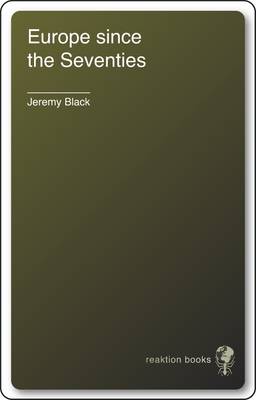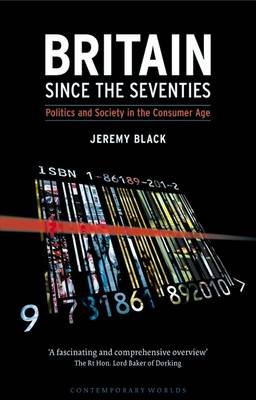Contemporary Worlds
4 total works
As the home of nearly 300 million people spread over approximately 3.7 million square miles of earth, the United States poses a monumental challenge to all who try to grapple with its rich and immensely complex physical and social geography. Acclaimed historian Jeremy Black tackles this challenge through a literal and metaphorical road trip across America's physical and historical landscapes, analysing the ways that events in American history and culture since 1960 have remade the geography and demographics of America. Black works from the premise that the United States is a continent pretending to be a country. He examines the cultural clashes - and the tense harmony - between the numerous regional cultures uneasily contained within the United States' wide bounds. Suburban sprawl, the triumph of consumerism, the war over health care, immigration and Christian evangelicalism all play a part in these pages, as well as the tug of war within us government politics, and the alternating rise and fall of individualism and conformity. Black also has some telling new reflections on America's role abroad from Nixon's Vietnam to Bush Junior's Iraq.
In Altered States Black deftly reveals less examined aspects of American culture as they are manifested in the diverse peoples and landscapes that stretch from coast to coast.
In Altered States Black deftly reveals less examined aspects of American culture as they are manifested in the diverse peoples and landscapes that stretch from coast to coast.
Jeremy Black provides a succinct and authoritative analysis of the ways in which history and culture, economics and society have remade Europe in recent times. While his account reaches back to 1945, the main focus is on the last four decades. What emerges are the seeds for present issues that were sown in the past. "Europe since the Seventies" gives full treatment to environmental, demographic and cultural issues, alongside political, societal and economic matters, as well as taking in subjects such as crime, migration and transport. Jeremy Black reveals how European society has changed markedly since 1970: former mappings of the elements of society, based on economic activity and opportunity and understood in terms of class, have given way to issues of identity notably questions of gender, but also sexual orientation, race and consumerism. Europe has expanded its frontiers and the European Union has become a testing ground for all manner of aspirations. A timely, readable and cogent account, this latest volume from eminent historian Jeremy Black illuminates today's Europe through the lens of recent history.
In "Britain since the Seventies", well-known historian Jeremy Black examines the most recent developments in British political, social, cultural and economic history. Taking the triumph of consumerism as an organizing theme, he charts the rise and fall of the Conservative Party, developments in British society, culture and politics, environmental issues, questions of identity, and changes in economic circumstance and direction. Iconic issues such as BSE, transport, asylum seekers and the NHS are viewed from both national and international perspectives. Black's account of contemporary Britain challenges as well as entertains, seeking to engage the reader in the process of interpretation. Through the lens of the last three decades, the author unveils his image of a country in which uncertainty, contingency and change are the defining features. In charting the impact of increasing individualism, longevity and secularization, Black is drawn repeatedly to examine a fundamental paradox of modern Britain: 'At the start of both century and millennium, the British were more prosperous than ever before, but ...happiness has not risen with prosperity.'
"Britain since the Seventies" is a wide-ranging and cogent evaluation of recent British history, and as such will appeal to all those interested in the condition of modern Britain, and how it came to be so, as well as being an ideal introduction for students of the subject.
"Britain since the Seventies" is a wide-ranging and cogent evaluation of recent British history, and as such will appeal to all those interested in the condition of modern Britain, and how it came to be so, as well as being an ideal introduction for students of the subject.
Much writing on modern warfare pivots on discussion of the period beginning with the outbreak of the French Revolutionary Wars in 1792, with an emphasis on World Wars I and II, and a postscript on the Cold War. For conflicts since 1945, the Cold War thesis has been dominant, subordinating other events, especially in the developing world, to the confrontation between East and West. Now, however, it appears less convincing to analyse the second half of the century in these terms, and more necessary to search for new approaches and concepts. Jeremy Black's provocative new book re-evaluates modern warfare in recent times. Moving beyond the Cold War paradigm, the book focuses instead on the variety of post-1945 conflicts and the diversity of goals and methods that have been employed. Central to the book is its global coverage and, in particular, its emphasis on the importance of the Third World in any account of this period. Black argues that the Cold War narrative, so securely located within the Western intellectual tradition, pays insufficient attention to the diversity of military force structures, methods, goals and cultures that have existed in modern times.
Rather than the familiar supply-side assessments that view improvements in weaponry or increases in numbers without adequately considering the wider context, Black presents a demand-led account of warfare that focuses on the 'tasking' of the military. As such, this book provides an original interpretation of modern warfare. Concluding with a consideration of the current 'war on terror', this topical, accessible and clearly argued book will be important to all those interested in conflict and military history.
Rather than the familiar supply-side assessments that view improvements in weaponry or increases in numbers without adequately considering the wider context, Black presents a demand-led account of warfare that focuses on the 'tasking' of the military. As such, this book provides an original interpretation of modern warfare. Concluding with a consideration of the current 'war on terror', this topical, accessible and clearly argued book will be important to all those interested in conflict and military history.



